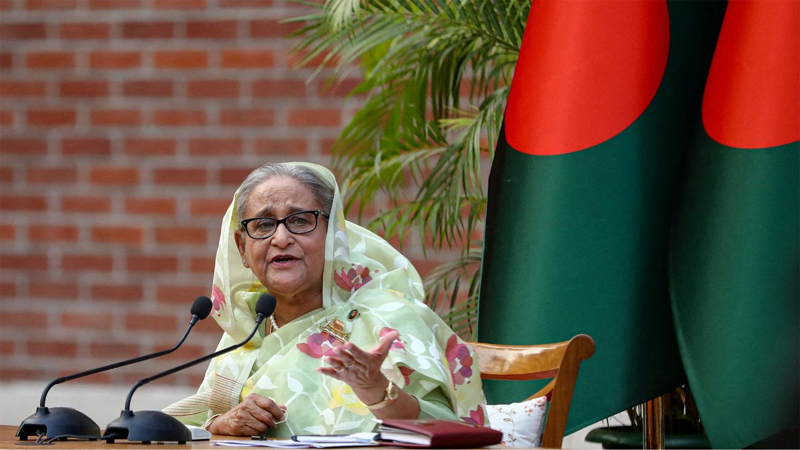DHAKA, Dec 23: On Monday, Bangladesh’s interim government announced that it has submitted a diplomatic note to New Delhi requesting the extradition of deposed Prime Minister Sheikh Hasina from India. This request could exacerbate tensions between the two nations.
India acknowledged receipt of the diplomatic communication, known as a ‘note verbale’, from the Bangladesh High Commission in New Delhi, but refrained from providing any additional commentary.
Touhid Hossain, the unofficial foreign minister of Bangladesh, stated that Dhaka is seeking Hasina’s return to face legal proceedings.
“We have communicated to the Indian government that Bangladesh wishes to bring her back for the judicial process,” Hossain informed reporters in Dhaka.
In response, External Affairs Ministry spokesperson Randhir Jaiswal in New Delhi confirmed the receipt of the note, saying, “We acknowledge receipt of a Note Verbale from the Bangladesh High Commission today regarding the extradition request.” He added, “At this stage, we have no further comments on this matter.”
Hasina, 77, has been residing in India since August 5, after fleeing the country amidst widespread protests led by students, which ended her 16-year rule.
The Bangladesh International Crimes Tribunal (ICT) has issued arrest warrants for Hasina, as well as several former Cabinet ministers, advisers, and military and civil officials for alleged “crimes against humanity and genocide.”
The relationship between India and Bangladesh has soured since Muhammad Yunus took office as head of the interim government.
India has expressed concerns regarding the treatment of minorities, particularly Hindus, in Bangladesh.
Earlier on Monday, Home Adviser Jahangir Alam announced that his office sent a letter to the foreign ministry to expedite Hasina’s extradition from India. “We have initiated the process regarding her extradition,” he stated in response to inquiries.
Alam mentioned that an extradition treaty exists between Dhaka and New Delhi which could facilitate Hasina’s return to Bangladesh.
Last month, during a national address marking 100 days of the interim government, Chief Adviser Yunus stated that they would pursue Hasina’s extradition, saying, “We must ensure justice for every killing… We will request India to return the ousted autocrat Sheikh Hasina.”
Yunus, who took office on August 8, claimed that around 1,500 individuals, including students and workers, were killed and nearly 20,000 wounded during the protests against Hasina’s administration.
In October, Law Adviser Asif Nazrul reportedly indicated that Bangladesh would strongly object if India attempted to deny Hasina’s extradition on any grounds provided by the treaty.
In an interview with PTI in Dhaka in September, Yunus referred to Hasina making political statements from India as an “unfriendly gesture”, insisting that she should refrain from making any comments to avoid causing discomfort to both nations until Bangladesh requests her extradition.
“If India chooses to keep her until Bangladesh requires her return, then she must remain silent,” he asserted.
Recently, Hasina has accused the Yunus-led interim government of committing “genocide” and failing to safeguard minorities, particularly Hindus, since her ousting.
There has been a notable increase in attacks on minority communities, including Hindus, in Bangladesh in recent months.
Two weeks ago, Foreign Secretary Vikram Misri visited Dhaka and conveyed India’s concerns, particularly regarding the safety and welfare of minorities. (PTI)


Leave a Reply